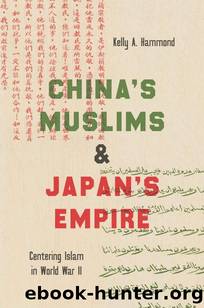China's Muslims and Japan's Empire (Islamic Civilization and Muslim Networks) by Kelly A. Hammond

Author:Kelly A. Hammond [Hammond, Kelly A.]
Language: eng
Format: epub
Publisher: The University of North Carolina Press
Published: 2020-09-29T18:30:00+00:00
Homeward Bound
As he prepared to leave Mecca, Tang confessed that he was happy he would never have to ride a camel again, which he complained was way more trouble than it was worth (C. tai mafan le).117 Of course, Tang would have been familiar with camels, which were commonly seen in markets around Beijing, but he may not have ever ridden one until he arrived in Arabia.118 Although banal, these quotidian details provide insights into Tangâs character and into the variety of experiences the group had on their journey. While they waited for their boat in Jeddah, they visited the Chinese Guild Hall (C. Zhongguo huiguan) established a few years before by a Gansu Muslim, Ma Shaoyun. Tang explained that Ma had originally planned to build a Hezhou Guild Hall (C. Hezhou huiguan) in Jeddah but that not enough people from Hezhou went on hajj, so he named it the Chinese Guild Hall instead.119 Tangâs comments help contextualize the broad reach of native-place associations, not just for Han Chinese but also for Sino-Muslims traveling abroad in an era of increasing worldwide travel. In some ways, Sino-Muslims shared more in common with Han Chinese than they did with non-Chinese Muslims, at least in terms of the cultural fabric and social institutions common among overseas Chinese communities around the world.
Initially, the group had trouble getting passage back to Eritrea. Although plenty of boats moved through the Red Sea, they were full of Italian army officers traveling to East Africa or Jews and other groups fleeing Germany and Eastern Europe on whatever vessels would take them.120 They finally departed the day before the Chinese Lunar New Year. The group celebrated by drinking coffee and barbequing a fish that they caught off the stern of the boat. With a few days to spare in Massawa, the men managed to track down all the ingredients needed to make dumplings (C. bao jiaozi) and celebrate the Lunar New Year. This small gesture of spending an evening cooking together further reminds us that although Tang and his companions were devout and pious Muslims, they were also active participants in distinctly East Asian rituals. The group spent the evening recreating a comforting and familiar atmosphere far from their homes and families.
The first thing the group did after arriving back in Shanghai was go to a halal restaurant. The restaurateurs were apparently shocked by how much food the men consumed, but Tang explained that it had been more than two months since they had eaten ârealâ Chinese food.121 The following morning Ma went to buy the boat tickets to Qingdao while Tang and Su headed to the market near the Hongkou Bridge to get provisions for the trip. When they arrived at the Hongkou Bridge, they were stopped by a Japanese soldier who asked them in Chinese what they were doing there. Tangâs explanation that they were buying provisions for their boat ride to Qingdao seemed to satisfy the soldier.122 The tense encounters with the Japanese soldiers highlight that
Download
This site does not store any files on its server. We only index and link to content provided by other sites. Please contact the content providers to delete copyright contents if any and email us, we'll remove relevant links or contents immediately.
| Africa | Americas |
| Arctic & Antarctica | Asia |
| Australia & Oceania | Europe |
| Middle East | Russia |
| United States | World |
| Ancient Civilizations | Military |
| Historical Study & Educational Resources |
The Story of China by Michael Wood(954)
Mr. Selden's Map of China by Timothy Brook(811)
Philippines--Culture Smart! by Culture Smart!(711)
Heroic Hindu Resistance To Muslim Invaders (636 AD to 1206 AD) by Sita Ram Goel(689)
Akbar: The Great Mughal by Ira Mukhoty(673)
Vedic Physics: Scientific Origin of Hinduism by Raja Ram Mohan Roy(663)
First Platoon by Annie Jacobsen(663)
The Meaning of India by Raja Rao(662)
Food of India by unknow(661)
Banaras by Diana L. Eck(648)
India--Culture Smart! by Becky Stephen(628)
China Unbound by Joanna Chiu(628)
North of South by Shiva Naipaul(626)
Mao's Great Famine: The History of China's Most Devastating Catastrophe, 1958-1962 by Frank Dikötter(608)
Insurgency and Counterinsurgency by Jeremy Black(595)
The Genius of China: 3,000 Years of Science, Discovery, and Invention by Robert Temple(594)
How to Be a Modern Samurai by Antony Cummins(585)
A History of Japan by R.H.P. Mason & J.G. Caiger(584)
The Digital Silk Road by Jonathan E. Hillman(580)
